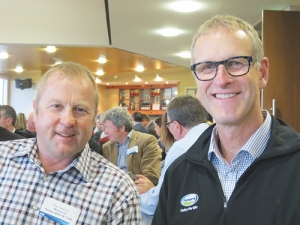Biosecurity tops priorities for agribusiness leaders - report
Biosecurity remains the top priority for agribusiness leaders, according to KPMG’s 2025 Agribusiness Agenda released last week.
 Special agricultural trade envoy Mike Petersen (left) and Fonterra director Michael Spaans at the launch of KPMG’s Agribusiness Report at Fieldays
Special agricultural trade envoy Mike Petersen (left) and Fonterra director Michael Spaans at the launch of KPMG’s Agribusiness Report at Fieldays
Ranked sixth in importance by industry leaders is the need to develop future leaders.
KPMG’s Ian Proudfoot says the primary sector needs people from a diverse range of backgrounds – including app developers and consumer experience experts, as much as scientists and farm labourers. “There is no silver bullet for attracting people into a primary sector career given the low profile the industry has in schools and the historic perceptions of those who influence career choices.
“The recurring theme of our discussions was that the issue is too big for any single organisation to address [by itself].
“There is an urgent need for a well-designed, carefully messaged and widely communicated pan-industry career awareness initiative. It must explain what the primary sector is, what it produces, who it sells to and what it contributes to New Zealand. It must be clear that the industry offers a huge diversity of career options – jobs that require many different skills, with ambition and a desire to succeed as the only common attributes.”
Proudfoot says any strategy must lift the engagement with schools and universities, especially in cities where young people gain only limited insight into the primary sector and are presented with few obvious pathways into careers.
He says sector leaders need to get into schools and tell students their career stories, and companies need to support teachers to incorporate primary sector themes into the curriculum. School camps need to become farm stay experiences, and urban farms developed to enable every kid to gain industry awareness.
Coming in at a year-end total at 3088 units, a rise of around 10% over the 2806 total for 2024, the signs are that the New Zealand farm machinery industry is turning the corner after a difficult couple of years.
New Zealand's animal health industry has a new tool addressing a long-standing sustainability issue.
The Government has announced that ACC will be a sponsor of this year's FMG Young Farmer of the Year competition.
As veterinary student numbers grow to help address New Zealand's national workforce shortge, Massey University's School of Veterinary Science is inviting more veterinary practices to partner in training the next generation of vets.
South Island dairy farmers will soon be able to supply organic milk to Fonterra.
Norwood has announced the opening of a new Tasman dealership at Richmond near Nelson next month.